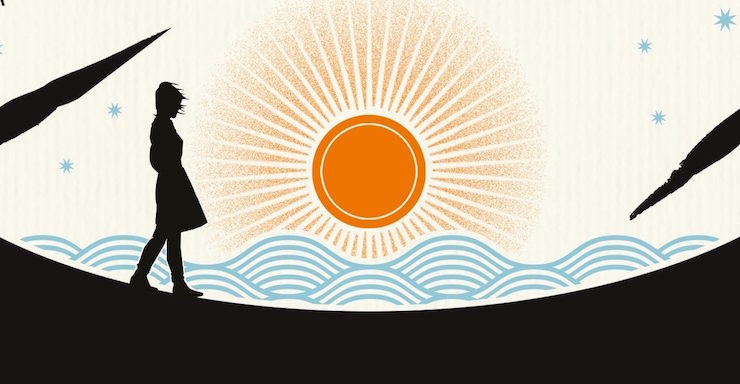The end of the world is a popular refrain in fiction and film. While it may feel like a fairly modern phenomenon, it is actually part of a long literary tradition, from the great floods of the Bible and the Epic of Gilgamesh, both dating back to somewhere between 1000 and 2000 BC, through nineteenth century classics like HG Wells’s The Time Machine, right up to recent cult hits such as The Walking Dead.
There are all sorts of theories about why we find apocalyptical stories so fascinating, but for me, it’s about taking human characters and placing them in extreme situations, where all their quirks and characteristics are thrown into sharp relief. How do people react in life-or-death scenarios? What sort of society would rise from the ashes of the old world? What kind of morality would remain?
No matter how distant a particular vision of the future might be, I’m always looking for those recognisable human moments, those acute little observations that make me think Oh yes, that’s it. That’s how it is.
Authors are endlessly creative when it comes to orchestrating an appropriate apocalypse for the particular needs of their characters and their story. Here are five very different apocalypses (now there’s a word that’s not often pluralized) in five very different books. Some of these worlds end in a single cataclysmic event, while others involve a slow fade-out, but they all have strong characters and sharply-drawn observations about what it means to be human.
Nod by Adrian Barnes
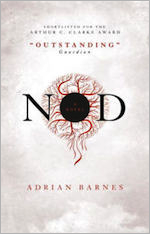 A brutal, unflinching look at what lies beneath the trappings of civilization. Overnight, the vast majority of the world’s population stops sleeping. The main character is one of the few remaining “sleepers,” and he is forced to watch as society disintegrates with terrifying speed. The author describes the desperation of the sleepless with a stark clarity that’s just a little too real for comfort. Most people will have experienced a bout of insomnia at some point in their lives, so, unlike many end-of-the-world scenarios, this one feels very close and very possible. Probably not one to read just before bed…
A brutal, unflinching look at what lies beneath the trappings of civilization. Overnight, the vast majority of the world’s population stops sleeping. The main character is one of the few remaining “sleepers,” and he is forced to watch as society disintegrates with terrifying speed. The author describes the desperation of the sleepless with a stark clarity that’s just a little too real for comfort. Most people will have experienced a bout of insomnia at some point in their lives, so, unlike many end-of-the-world scenarios, this one feels very close and very possible. Probably not one to read just before bed…
The Bone Clocks by David Mitchell
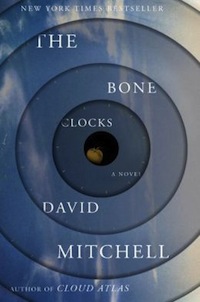 I wasn’t entirely sure whether this one belonged on this list, but I decided to squeeze it in anyway. The book as a whole isn’t an apocalyptical tale, but it does end with the disintegration of society as we know it. Over the course of the book we see the main character, Holly, grow from a teenager in the eighties to an old woman, trying to scrape a living in a world where the power has largely gone off, sinking human civilization into a time of “Endarkenment.” A frightening and realistic portrayal of humanity clinging onto the last fragments of their old way of life, while realising, too late, that this particular end-of-the-world situation was entirely man-made, and quite possibly avoidable.
I wasn’t entirely sure whether this one belonged on this list, but I decided to squeeze it in anyway. The book as a whole isn’t an apocalyptical tale, but it does end with the disintegration of society as we know it. Over the course of the book we see the main character, Holly, grow from a teenager in the eighties to an old woman, trying to scrape a living in a world where the power has largely gone off, sinking human civilization into a time of “Endarkenment.” A frightening and realistic portrayal of humanity clinging onto the last fragments of their old way of life, while realising, too late, that this particular end-of-the-world situation was entirely man-made, and quite possibly avoidable.
Station Eleven by Emily St. John Mandel
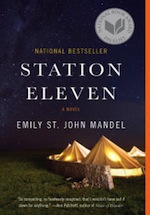 The fatal virus is a popular fictional device, but Emily St. John Mandel handles it with a light touch, focusing on the individual stories, both of those fated to die in the pandemic, and those destined to survive beyond the ending of the old world. Some classic apocalyptical themes—religion, brutality—are woven together with some more unusual elements, such as the travelling theatre at the heart of the story, and the eponymous Station Eleven comic. This is ultimately a story of hope. No matter how bleak things might be, people will still find beauty in the world.
The fatal virus is a popular fictional device, but Emily St. John Mandel handles it with a light touch, focusing on the individual stories, both of those fated to die in the pandemic, and those destined to survive beyond the ending of the old world. Some classic apocalyptical themes—religion, brutality—are woven together with some more unusual elements, such as the travelling theatre at the heart of the story, and the eponymous Station Eleven comic. This is ultimately a story of hope. No matter how bleak things might be, people will still find beauty in the world.
The End of the World Running Club by Adrian J. Walker
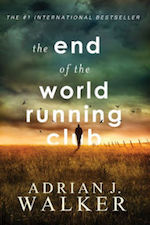 This is another book where the experiences of the main character at times brush just a little too close to real life. The main character, Ed, is a husband and father, but struggles with what that means. When the northern hemisphere is reduced to rubble by a deadly meteor strike, he has to find a way to balance family life with basic survival. For me, one of the enduring images is that of Ed frantically searching for his older child’s favourite cuddly toy while a screaming horde claw at his front door and meteors streak towards the Earth. By turns a roar of defiance against the brutality of a broken world, and a lament for everything left undone and unsaid, this book tugs at your emotions in some unexpected ways.
This is another book where the experiences of the main character at times brush just a little too close to real life. The main character, Ed, is a husband and father, but struggles with what that means. When the northern hemisphere is reduced to rubble by a deadly meteor strike, he has to find a way to balance family life with basic survival. For me, one of the enduring images is that of Ed frantically searching for his older child’s favourite cuddly toy while a screaming horde claw at his front door and meteors streak towards the Earth. By turns a roar of defiance against the brutality of a broken world, and a lament for everything left undone and unsaid, this book tugs at your emotions in some unexpected ways.
The Chimes by Anna Smaill
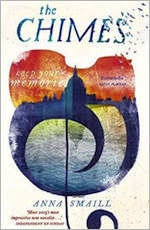 I’m not sure quite how to describe the end-of-the-world scenario in this unique story. It’s something to do with music and memory, and quasi-religious order who use a giant instrument to essentially wipe people’s minds at the end of each day, leaving them with only the most basic understanding of their own identity and purpose. Music is the most important thing in this world, and the author’s skillful world-building focuses on musical language and imagery. Beautifully written and slightly elusive, this is something very different to most apocalyptical or dystopian tales.
I’m not sure quite how to describe the end-of-the-world scenario in this unique story. It’s something to do with music and memory, and quasi-religious order who use a giant instrument to essentially wipe people’s minds at the end of each day, leaving them with only the most basic understanding of their own identity and purpose. Music is the most important thing in this world, and the author’s skillful world-building focuses on musical language and imagery. Beautifully written and slightly elusive, this is something very different to most apocalyptical or dystopian tales.
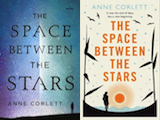 Anne Corlett is originally from the north-east of England, but sort of slid down the map, ending up in the south-west. Her articles and short stories have been published in various magazines and anthologies and her debut novel, The Space Between the Stars is out June 1st in the UK and June 13th in the US. She lives just outside Bath with her partner and three young sons. One of these is currently trying to facilitate the writing of her second novel, while the other three are doing their level best to prevent it.
Anne Corlett is originally from the north-east of England, but sort of slid down the map, ending up in the south-west. Her articles and short stories have been published in various magazines and anthologies and her debut novel, The Space Between the Stars is out June 1st in the UK and June 13th in the US. She lives just outside Bath with her partner and three young sons. One of these is currently trying to facilitate the writing of her second novel, while the other three are doing their level best to prevent it.










